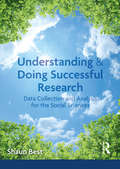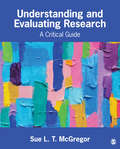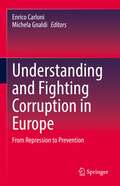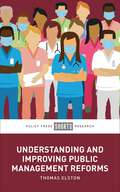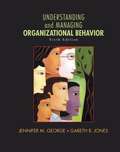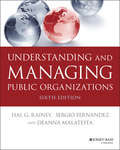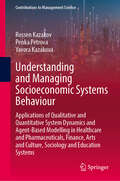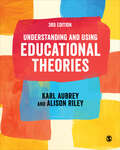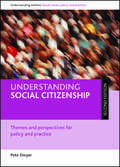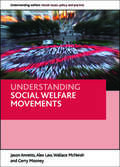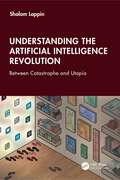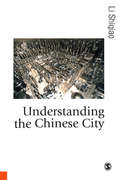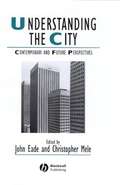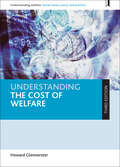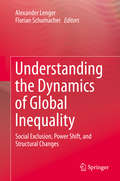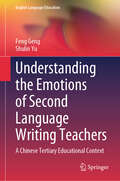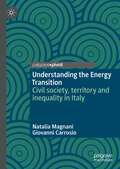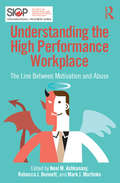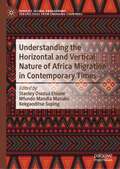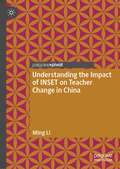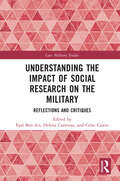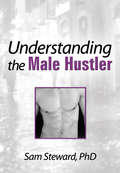- Table View
- List View
Understanding and Doing Successful Research: Data Collection and Analysis for the Social Sciences
by Shaun BestResearch Methods is an essential guide to carrying out a research project. Each of the focused chapters introduces and explains an aspect of social research to readers who may have no experience or knowledge of this subject. The emphasis is on 'how to do' various different methods, how to decide which is the most appropriate, and how to analyse the data. The book also includes examples of good practice from a range of social science disciplines.
Understanding and Evaluating Research: A Critical Guide
by Sue L. McGregorUnderstanding and Evaluating Research: A Critical Guide shows students how to be critical consumers of research and to appreciate the power of methodology as it shapes the research question, the use of theory in the study, the methods used, and how the outcomes are reported. The book starts with what it means to be a critical and uncritical reader of research, followed by a detailed chapter on methodology, and then proceeds to a discussion of each component of a research article as it is informed by the methodology. The book encourages readers to select an article from their discipline, learning along the way how to assess each component of the article and come to a judgment of its rigor or quality as a scholarly report.
Understanding and Evaluating Research: A Critical Guide
by Sue L. McGregorUnderstanding and Evaluating Research: A Critical Guide shows students how to be critical consumers of research and to appreciate the power of methodology as it shapes the research question, the use of theory in the study, the methods used, and how the outcomes are reported. The book starts with what it means to be a critical and uncritical reader of research, followed by a detailed chapter on methodology, and then proceeds to a discussion of each component of a research article as it is informed by the methodology. The book encourages readers to select an article from their discipline, learning along the way how to assess each component of the article and come to a judgment of its rigor or quality as a scholarly report.
Understanding and Fighting Corruption in Europe: From Repression to Prevention
by Michela Gnaldi Enrico CarloniThe volume includes comparative and comprehensive discussions on anti-corruption policies of governments and anti-corruption agencies across Europe. Compared to existing literature that focuses either on general and theoretical aspects related to corruption or on country-specific experiences, this volume provides an interdisciplinary and broad overview of corruption prevention policies and measures undertaken by major European member states, relying both on literature and on institutional documentation of national anti-corruption agencies, which greatly contribute to shaping anti-corruption policy directions. In so doing, it advances the existing theoretical agenda of corruption studies and policies, situating it within wider disciplinary fields. This volume is especially concerned with the interrelationship between good administration, integrity, ethical behaviour and corruption; the role of transparency and digitalisation in preventing corruption and ensuring rights, efficiency and impartiality in the public administration; the measurement of corruption, with specific reference to preventative measures and indicators of administrative anti-corruption efforts; big data, block chains, and artificial intelligence; public management codes of ethics, performance targets and skills, and their role in tackling and preventing corruption; and public procurement, transparency and anti-bribery measures in the European public procurement system. This volume is of interest to graduate students and researchers in political sociology, political science, European corruption law, international relations, public policy, and social statistics.
Understanding and Improving Public Management Reforms
by Thomas ElstonWhy do top-down reforms to public services so often over-promise and under-deliver? Using five concepts from psychology, economics and organisational sociology, Thomas Elston addresses this pressing question of good governance. Rather than focusing on the challenge of implementation, Understanding and Improving Public Management Reforms reveals how flawed policy design is often the major contributor to reform failure. Cognitive bias, restrictive social institutions and inattention to ‘quiet costs’ during the policy-making process are essential to explaining the poor track record of reforms to date – and point the way towards better decision-making in future. Written for policy professionals, service managers, students and researchers alike, this concise, practical and multidisciplinary study draws on varied examples to help reconceive the perennial problem of public management reform – and to propose new solutions.
Understanding and Managing Organizational Behavior
by Gareth R. Jones Jennifer M. GeorgeVivid examples, thought-provoking activities--get engaged in OB. George/Jones uses real-world examples, thought- and discussion-provoking learning activities to help readers become more engaged in what they are learning. This text also provides the most contemporary and up-to-date account of the changing issues involved in managing people in organizations. The sixth edition features new cases, material addressing the economic crisis, and expanded coverage of ethics and workplace diversity.
Understanding and Managing Public Organizations (Essential Texts for Nonprofit and Public Leadership and Management)
by Hal G. Rainey Sergio Fernandez Deanna MalatestaDiscover the latest insights in organization theory from a comprehensive and masterful volume Understanding and Managing Public Organizations, 6th Edition provides readers with an authoritative reference for scholars, masters, and doctoral students in public management and public affairs programs in the United States and other nations. The 6th Edition of Understanding and Managing Public Organizations presents the latest research and insights from organization and management theory and their application to public organizations and the people in them. The book expands coverage from previous editions about organizational goals, performance and effectiveness, strategy, decision-making, structure and design, organizational change, operating environments, individuals and groups, motivation and work-related attitudes, leadership, teamwork, and more. Authors and professors Hal Rainey, Sergio Fernandez, and Deanna Malatesta provide new and expanded coverage of such topics as The context and distinctive character of public and nonprofit organizations, including expanded coverage of "publicness" and of the legal context including "state action" Performance management, measurement, organizational effectiveness, and managing for high performance Representative bureaucracy, workforce diversity, and performance Communication and information technology Employee engagement and empowerment, intrinsic motivation, self-determination theory, public service motivation, and positive organizational behavior—resilience, self-efficacy, optimism, and hope Recent developments in theory and thought on leadership, including authentic leadership, shared leadership, servant leadership, and integrated leadership Design and process topics including red tape and green tape, administrative burdens, and organizational routines Theoretical perspectives such as behavioral theory of decision making, resource dependence theory, and others, and their implications for public and nonprofit organizations Advances in theory and practice about rapid developments in collaborative governance, organizational networks, partnerships, and contracting Since the book is used in courses for students in numerous public affairs programs, this new edition updates the Instructor’s Guide, with new and revised PowerPoint slides, cases, exercises, and discussion and examination questions These materials, with the topics in the chapters, are designed to address the learning outcomes required by NASPAA accreditation requirements Belonging on the shelf of scholars and students in public affairs, as well as anyone interested in public management or organization theory, this new edition of Understanding and Managing Public Organizations provides an advanced and comprehensive enhancement to a widely used and compelling series of previous editions.
Understanding and Managing Socioeconomic Systems Behaviour: Applications of Qualitative and Quantitative System Dynamics and Agent-Based Modelling in Healthcare and Pharmaceuticals, Finance, Arts and Culture, Sociology and Education Systems (Contributions to Management Science)
by Rossen Kazakov Penka Petrova Yavora KazakovaThis book illustrates effective decision-making in complex socio-economic systems utilising system dynamics and agent-based simulation modelling approaches. It provides practical guidance on the application of conceptual and numerical modelling and simulation for analysing economic, strategic, regulatory, sociological and ethical questions from a complex systems perspective. Its theoretical, methodological and practical illustrations will enhance readers’ understanding of the application of simulation modelling for effective systems management. By virtually experimenting with alternative management scenarios, it will help them improve decision-making and control mechanisms. The book explores practical examples from the fields of pharmaceuticals, healthcare, finance, sociology, education and culture from a strategic, regulatory and ethics perspective. As such, it offers a valuable resource for managers, both at for-profit corporations and non-profit organisations, public policymakers and regulators alike.
Understanding and Using Educational Theories
by Karl Aubrey Alison RileyThis textbook gives readers a clear overview of a selection of 19 of the most influential thinkers on education, including established names (Vygotsky, Bruner, Dewey), more recent thinkers (Freire, hooks, Claxton) and other key names whose writing has helped shaped our views on teaching and learning. Each chapter includes practical examples showing how theories can be used to inform classroom teaching, and critiques of each theorist exploring opposing viewpoints and the strengths and weaknesses of different ideas. This third edition includes: New chapters on Barak Rosenshine and Daniel Goleman Revamped reflective tasks with a greater practical focus for the classroom More models and theoretical diagrams throughout This is an essential primer for any university course that includes learning theory, with particular relevance for initial teacher education, education studies and early childhood degrees. Karl Aubrey has recently retired from his post at Bishop Grosseteste University. Alison Riley is the Programme Leader for the BA Early Childhood Studies at Bishop Grosseteste University.
Understanding and Using Educational Theories
by Karl Aubrey Alison RileyThis textbook gives readers a clear overview of a selection of 19 of the most influential thinkers on education, including established names (Vygotsky, Bruner, Dewey), more recent thinkers (Freire, hooks, Claxton) and other key names whose writing has helped shaped our views on teaching and learning. Each chapter includes practical examples showing how theories can be used to inform classroom teaching, and critiques of each theorist exploring opposing viewpoints and the strengths and weaknesses of different ideas. This third edition includes: New chapters on Barak Rosenshine and Daniel Goleman Revamped reflective tasks with a greater practical focus for the classroom More models and theoretical diagrams throughout This is an essential primer for any university course that includes learning theory, with particular relevance for initial teacher education, education studies and early childhood degrees. Karl Aubrey has recently retired from his post at Bishop Grosseteste University. Alison Riley is the Programme Leader for the BA Early Childhood Studies at Bishop Grosseteste University.
Understanding social citizenship: Themes and perspectives for policy and practice (Understanding Welfare: Social Issues, Policy and Practice)
by Peter DwyerThis updated and revised edition of Understanding social citizenship is still the only citizenship textbook written from a social policy perspective. It provides students with an understanding of the concept of citizenship in relation to UK, EU and global welfare institutions; covers a range of welfare debates and issues; explores inclusion and exclusion; combines analysis and discussion of social policies and uses easy-to-digest text boxes. The revised second edition contains new topical sections on 'Cameron's Conservatism' and the EU and A8/10 migration in the UK. The book is essential reading for undergraduates in social policy, sociology, social work, politics and citizenship, A/AS level students and their teachers, and those on access courses, foundation degrees and teacher training courses.
Understanding social welfare movements (Understanding Welfare: Social Issues, Policy and Practice)
by Alex Law Jason AnnettsContemporary social policy has never been more vigorously contested. Issues range from single-issue campaigns over housing, social care, hospital closures through to organised movements around disability, environment, health and education. However, the historical and contemporary role played by social movements in shaping social welfare has too often been neglected in standard social policy texts. Understanding social welfare movements is the first text to bring together social policy and social movement studies. Using actual case studies and written in an accessible and engaging style, it will attract a wide readership of undergraduate and postgraduate students, higher education teachers and researchers, stakeholders and activists. Introductory chapters examine the historical and theoretical relationship between state welfare and social movements. Subsequent chapters outline the historical contribution of various social movements to the creation of the welfare state relating to Beveridge's 'five giants' of idleness, ignorance, squalor, illness and want. The book then examines the contemporary challenge posed by 'new social movements' in relation to the family, discrimination, environment, and global social justice. The book provides a timely and much needed overview of the changing nature of social welfare as it has been shaped by the demands of social movements.
Understanding the Artificial Intelligence Revolution: Between Catastrophe and Utopia
by Shalom LappinAfter many years during which it languished in relative obscurity, in remote classrooms of computer science departments and in small prototype projects for tech companies, artificial intelligence (AI) is now a searingly hot topic across the media. Yet much of the public discussion is so feverish that an understanding of the basic scientific and engineering elements of the field is easily lost, often resulting in exaggerated claims, as well as dangerously neglected threats.This concise and sober book presents a brief history of AI, explaining in clear language the central engineering innovations that have produced the current revolution. It distinguishes between imagined dangers and the very real problems that AI is creating. Spread across seven short and accessible chapters, this book explains the developments behind deep learning and the applications of deep neural networks (DNNs). It addresses both the imagined and actual risks posed by the AI revolution, before outlining the elements of a rational public policy on AI, covering topics like tech monopolies, disinformation, bias, hate speech, intellectual property rights, and inequality.Suitable for the general reader, Understanding the Artificial Intelligence Revolution: Between Catastrophe and Utopia is the ideal book for anyone seeking a clear and informed introduction to AI.
Understanding the Chinese City (Published in association with Theory, Culture & Society)
by Li ShiqiaoThis book teaches us to read the contemporary Chinese city. Li Shiqiao deftly crafts a new theory of the Chinese city and the dynamics of urbanization by: exploring the rise of stories of labour, finance and their hierarchies examining how the Chinese city has been shaped by the figuration of the writing system analyzing the continuing importance of the family and its barriers of protection against real and imagined dangers demonstrating how actual structures bring into visual being the networks of safety in personal and family networks. Understanding the Chinese City elegantly traces a thread between ancient Chinese city formations and current urban organizations, revealing hidden continuities that show how instrumental the past has been in forming the present. Rather than becoming obstacles to change, ancient practices have become effective strategies of adaptation under radically new terms.
Understanding the City: Contemporary and Future Perspectives (IJURR Studies in Urban and Social Change Book Series #47)
by Christopher Mele John EadeThis cutting-edge, multi-disciplinary analysis looks ahead to the direction which urban studies is likely to take during the twenty-first century.
Understanding the Cost of Welfare: What Welfare Costs And How To Pay For It (Understanding Welfare: Social Issues, Policy and Practice)
by Howard GlennersterThe challenge of meeting the growing cost of welfare is one of the most pressing issues facing governments of our time. Glennerster’s authoritative Understanding the cost of welfare assesses what welfare costs and how it is funded sector-by-sector. The book is written in a clear, accessible style, ideally suited to both teaching and study, and the general reader. This substantially revised third edition includes: • Discussion of the many funding issues now facing welfare states, such as demographic change, tax resistance, slow growth and austerity programmes • The theory and practice of devolved tax and budgetary responsibilities between UK nations and in comparison with other countries • New chapters on pensions and post-16 education • More regular and extensive comparative analysis Divided into 3 sections, covering Principles, Service funding, and The Future, the book Includes questions for discussion and suggestions for further reading, making it an easy-to-use, essential resource for both undergraduate and post-graduate students of Social Policy, Sociology, Politics and Public Administration.
Understanding the Dynamics of Global Inequality
by Alexander Lenger Florian SchumacherDespite the fact that the globalization process tends to reinforce existing inequality structures and generate new areas of inequality on multiple levels, systematic analyses on this very important field remain scarce. Hence, this book approaches the complex question of inequality not only from different regional perspectives, covering Africa, Asia, Europe, Latin and Northern America, but also from different disciplinary perspectives, namely cultural anthropology, economics, ethnology, geography, international relations, sociology, and political sciences. The contributions are subdivided into three essential fields of research: Part I analyzes the socio-economic dimension of global exclusion, highlighting in particular the impacts of internationalization and globalization processes on national social structures against the background of theoretical concepts of social inequality. Part II addresses the political dimension of global inequalities. Since the decline of the Soviet Union new regional powers like Brazil, China, India and South Africa have emerged, creating power shifts in international relations that are the primary focus of the second part. Lastly, Part III examines the structural and transnational dimension of inequality patterns, which can be concretized in the rise of globalized national elites and the emergence of multinational networks that transcend the geographical and imaginative borders of nation states.
Understanding the Emotions of Second Language Writing Teachers: A Chinese Tertiary Educational Context (English Language Education #40)
by Shulin Yu Feng GengThis book incorporates both practice-based information and research to underpin teachers' emotions in the teaching and learning settings of second language (L2) writing, in the Chinese tertiary educational context. It introduces and validates a new conceptual framework for evaluating the causes and effects of the emotions of L2 writing teachers and investigates their emotional experiences in the context of the classroom. Additionally, it demonstrates the mediating effect of emotion-regulation strategies on L2 writing teachers’ pedagogical practices, writing assessment practices, teacher–student relationships, and well-being. Finally, this book provides theoretical, practical, and pedagogical implications of emotion regulation and management in order to implement the L2 writing curriculum.
Understanding the Energy Transition: Civil society, territory and inequality in Italy
by Natalia Magnani Giovanni CarrosioThe transformation of the dominant model of centralized energy production from fossil fuels to renewable energies is at the center of the public and scientific debate, as well as the subject of national and European policies, as it is connected to highly topical issues such as climate change, emissions reduction and natural disasters, security of supply and sustainability of the current economic development model.Up to now this topic has been mainly addressed by the economic and engineering sciences, with a research focus on the hardware rather than on the human and social software.However, energy systems, and the possibilities of change, are not only economic or technological but involve also patterns of social life, representations, organizational models and relational structures. In order to generate the social preconditions for the transition to a low-emission society, focused on a growing production of energy from renewable sources and on a greater sustainability of consumption, it is therefore urgent to reaffirm the centrality of a sociological approach to energy.This book focused on three core research areas which are crucial to understand what is at stake with the energy transition: conflicts over the construction and location of renewable energy production plants; collective action on renewable sources that promote a new model of energy system in which consumers are also producers; and the social-territorial impact of energy policies.
Understanding the High Performance Workplace: The Line Between Motivation and Abuse (SIOP Organizational Frontiers Series)
by Neal M. Ashkanasy Rebecca J. Bennett Mark J. MartinkoThis book asks the crucial question: When does high performance supervision become abusive supervision? As more organizations push to adopt high performance work practices (HPWP), the onus increasingly falls on supervisors to do whatever it takes to maximize the productivity of their work teams. In this rigorous, research-based volume, international contributors offer insight into how and when seemingly-beneficial workplace practices cross the line from motivation to abuse. By reviewing critical issues in both high performance work practices and abusive supervision, it illuminates the crossover between these two modes of work, and forges a path for future scholarship.
Understanding the Horizontal and Vertical Nature of Africa Migration in Contemporary Times (Africa's Global Engagement: Perspectives from Emerging Countries)
by Mfundo Mandla Masuku Stanley Osezua Ehiane Kekgaoditse SupingThe book project strives to establish and interpret the experiences and realities of African migration using African epistemology and philosophy. The significance of this book is triggered by an observation that seeks to propound the Eurocentric paradigm as not being the only dominating, acceptable, or legitimate approach to knowledge in explaining the evolution and dynamics of African migration. Africans have a long history of migration, both involuntary and voluntary. Contemporary African migrants have experienced three (3) types of migration, namely labour migration, forced migration or refugee movement, and skilled professional migration. These types of migration take place within the continent and between Africa and other continents. The book seeks to explore and cover a wide array of issues experienced by contemporary African migrants. This includes, but is not limited to, what and who a contemporary African migrant is; factors that influence contemporary African migration; the role and impact of regional institutions and other transnational entities on contemporary African migration; the challenges of contemporary African migrants; the impact of contemporary African migrants in national, regional, international politics and economy; the role of a contemporary African migrant on regional integration.
Understanding the Impact of INSET on Teacher Change in China
by Ming LiThis pivot considers the impact of INSET courses on EFL teachers practicing under the national curriculum reform in China. Providing context-specific findings on the policy and implementation of INSET as well as its impact on teacher education initiatives in both China and similar contexts, it explores the limitations of one off training events such as INSET and the inconsistency between teacher learning results and their classroom practices. The book argues that teachers, when returning to pre-INSET teaching, are influenced by their prior deeply-rooted beliefs largely considered more powerful than newly-learnt theories. Addressing the rarely discussed fact that the complex and dynamic characteristics of teacher learning change over time and support the construct of teacher learning as a social event rather than a one-off event, the book also offers practical solutions on how to improve teacher education and enhance the long-term INSET impact on teacher development, with the ambition of promoting education reform for both teachers and students alike.
Understanding the Impact of Social Research on the Military: Reflections and Critiques (Cass Military Studies)
by Eyal Ben-AriThis book seeks to chart and evaluate the impact of social research on the military itself. By ‘impact’, the authors in this volume simply mean that which has a marked effect or influence on changing military policy, practices, knowledge, skills, behaviour, or living conditions. The book comprises a series of reflective contributions from scholars who have conducted research on the military as external scholars with no formal ties to the armed forces, as 'native' researchers formally linked to them, as well as various kinds of contracted social scientists enabled by the military to carry out their investigations. The authors were asked to make the question of the impact of social scientific research on the armed forces an object of study in itself and to situate their reflections in terms of wider analytical questions. As a result, the chapters can be divided, broadly speaking, into two types of orientation: some are centered on theoretical and analytical issues, while others focus on the researchers’ lived experiences. This book will be of interest to students of military studies, sociology, organisational studies, psychology and political science.
Understanding the Japanese Mind
by James Clark MoloneyExplore the intricate layers of Japanese culture and psychology with James Clark Moloney's insightful work, Understanding the Japanese Mind. This illuminating book delves deep into the unique characteristics and complexities that define Japanese thought and behavior, offering readers a comprehensive guide to understanding the cultural and psychological underpinnings of one of the world’s most fascinating societies.James Clark Moloney, an expert in East Asian studies, combines his extensive research with firsthand experiences to provide a nuanced analysis of the Japanese psyche. Understanding the Japanese Mind covers a wide array of topics, including social norms, communication styles, and the values that shape daily life in Japan. Moloney’s clear and engaging writing makes complex cultural concepts accessible to a broad audience.Key themes in the book include the importance of harmony and group cohesion, the concept of face (tatemae and honne), and the intricate social rituals that govern Japanese interactions. Moloney also explores the historical and philosophical roots of these cultural traits, drawing connections to Zen Buddhism, Confucianism, and Shintoism.This book is an essential resource for students, scholars, business professionals, and anyone interested in gaining a deeper understanding of Japanese culture. Moloney’s balanced approach and thorough analysis offer readers a valuable perspective on the factors that influence Japanese behavior and thought processes.Join James Clark Moloney on a journey into the heart of Japanese culture, and gain a deeper appreciation for the complexities and nuances of the Japanese mind. Understanding the Japanese Mind is a timeless exploration of cultural psychology that continues to resonate with readers seeking to bridge the gap between East and West.
Understanding the Male Hustler
by Sam StewardThis book is a serious study of male hustlers using experiential dialogue to introduce the reader to real-life concepts and experiences that otherwise could not be effectively conveyed. An intriguing attempt to get into the mind and personality of the male hustler through a largely imagined series of dialogues between a well-known fictional hustler and his so-called amanuensis, Samuel Steward, this unique book covers all aspects of the hustler’s motivations, activities, life style, adjustments, advantages, and disadvantages. It accomplishes this dispassionately, without prejudgment, moral censure, approbation, or more than cursory involvement. Therapists and counselors in all fields of sexual functioning will find here some understanding of the causes and impulses (beyond the popular “broken home syndrome”) that lead young males into prostitution. It signals some of the signposts to danger and serious threats to health that accompany the profession of prostitution and also explains to counselors some of the activities and practices of the male prostitute, enabling them to have a better understanding of the fascination and peril of the hustler’s life. The brevity of success in such a calling is also considered, with some consideration for the necessity of long-range planning for the hustler’s future.Important contents: interview of a well-known hustler brief look at early male prostitution--Greek, Roman, Burton’s theory the peacock period and youth as a prerequisite for hustling lures of the profession--money, power, other motivations paths and mechanisms leading to hustling characteristics of different types of hustlers types of clients patronizing hustlers literary illuminations the modus operandi of the male hustler extraordinary dangers confronting the male hustler today the attractiveness of the “seeing-through” of a hustler to past clients quo vadis for the hustler after youth passes Readers will be amazed by the daily hazards and drawbacks as well fascinated by the curiosities and rewards of the hustler’s profession. Especially of interest to therapists and counselors, Understanding the Male Hustler is also valuable for sociologists, anthropologists, medical specialists, psychiatrists, psychologists.
